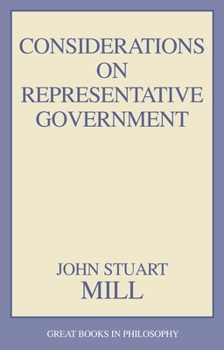Considerations on Representative Government
(Part of the Great Books in Philosophy Series)
Select Format
Select Condition 
Book Overview
In this powerful work, John Stuart Mill sets forth representative government as the most sensible compromise between unreflective rule by the masses and the self-indulgence of the few. The reader may sense that Mill is being pulled in opposing directions: steadfastly committed to majority rule with minority rights while at the same time being just enough of an aristocrat to believe that the masses need examplars to emulate.On Representative Government...
Format:Paperback
Language:English
ISBN:0879756705
ISBN13:9780879756703
Release Date:May 1991
Publisher:Prometheus Books
Length:365 Pages
Weight:0.55 lbs.
Dimensions:0.8" x 5.1" x 8.4"
Customer Reviews
1 rating
Worthwhile for Admirers
Published by Thriftbooks.com User , 14 years ago
Considerations on Representative Government is more dated than Mill's essentially timeless prior works but still very interesting and even useful. It in many ways follows directly from Utilitarianism, as it is in essence a practical application of utilitarian principles to modern government, thus potentially at least partly satisfying some who were put off by the prior essay's gaps. A systematic and near-comprehensive look at representative government, especially the British Victorian variety, it is a nice overview of an extremely relevant subject and interesting both historically and practically. Anyone wanting to know how representative government then stood need look no further, as Mill is extraordinarily candid, especially for someone who was actually a Member of Parliament, on both its pros and cons. His enumeration of the former may sometimes strikes present-day readers as at least slightly wrong-headed - though surprisingly rarely, given the many changes since made. He is even more eloquent speaking of the latter and offers numerous cogent reforms. Many of the problems - e.g., lack of female suffrage - have of course since been corrected; reading about these is a reassuring sign that governmental progress has been made despite all. That said, it can come as a great disappointment that several of the problems, such as minority disenfranchisement, are still very much with us; perhaps incredibly, others, such as representatives' inadequate morality/intelligence level, have even worsened. Some of Mill's proposals - for instance, having a non-partisan expert committee draft bills rather than the legislature - are at least as appealing now. That a century and a half has passed without their enactment is frustrating and even appalling. However historically valuable, the years have inevitably dated this essay somewhat, diluting its value. Aside from the obvious fact that some - though surprisingly little - of it is now moot, a few of Mill's Victorian assumptions, including Eurocentrism, as well as his general hostility to welfare, will certainly make current liberals shudder. That even one of the era's most outspoken and outstanding liberals could hold such views may disappoint but can also be seen as a sign of how far liberalism has come - or even as evidence of the historical march toward progress in which Mill so fervently believed. His European, and specifically British, focus may also lessen the value, but most of what he says is universally valuable. This is a must read for anyone interested in Mill, political philosophy, or Victorian politics.





